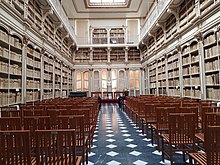University of Cagliari
This article needs additional citations for verification. (November 2020) |
Università degli Studi di Cagliari | |
 Coat of arms | |
| Latin: Universitas Studiorum Caralitana[1] | |
| Type | State-supported |
|---|---|
| Established | 1606 |
| Rector | Francesco Mola |
Administrative staff | teaching: 1,200, technical-administrative: 1,300 |
| Students | 31,102[2] |
| Location | , 39°13′01″N 9°06′54″E / 39.217°N 9.115°E |
| Campus | |
| Sports teams | CUS Cagliari <http://www.cuscagliari.it/> |
| Website | www |
The University of Cagliari (Italian: Università degli Studi di Cagliari) is a public research university in Cagliari, Sardinia, Italy. It was founded in 1606 and is organized in 11 faculties.
History
[edit]
The Studium Generalis Kalaritanum was founded in 1606[3][4] along the lines of the old Spanish Universities of Salamanca, Valladolid and Lleida, but it begins to operate only after the privilege of King Philip III of Spain in 1620.[5][6][7] as Universidad y Estudio General de Caller en el Reyno de Cerdeña (University and Gener Study of Cagliari in the Kingdom of Sardinia). It originally offered Law, Latin, Greek and Hebrew Literature, the Liberal Arts, Medicine, Surgery, Philosophy and Science. When Sardinia passed under the House of Savoy government in the 18th century, the statute of the university was significantly modified, with the expansion of the science faculties and institutes. Designed by the Piedmontese engineer Saverio Belgrano di Famolasco, the new university building was completed at the end of the 18th century. Today it hosts the Rectorate and the administrative offices. The 19th and 20th centuries saw more and more emphasis placed on research activities, with the achievement of important, internationally acclaimed results, especially in the fields of medicine, physics, chemistry, biology and archaeology.[citation needed]

A new university campus on the outskirts of town was recently built in Monserrato, on an area of 73 hectares. It hosts the science faculties, many departments with their respective faculties, and one of the university general hospitals, adequately integrated with other medical institutions.
Organization
[edit]There are the 11 faculties in which the university is divided into:
- Faculty of Economical, Giuridical and Political Sciences[8]
- Faculty of Humanistic Studies[9]
- Faculty of Engineering and Architecture[10]
- Faculty of Medicine and Surgery[11]
- Faculty of Biology and Pharmacy[12]
- Faculty of Sciences[13]
The university has about 36,000 enrolled students, a teaching staff of over 1,200 and a technical-administrative staff of about 1,300 people.
Coat of arms
[edit]The coats of arms of this university are, in the middle, the image of the Very Saint Conception, and at the foot a tiara of Pontiff with letter H that means the name of Saint Hylarius Pope, and below, two Prelate Mitres, in the one on the right hand, a letter L which means the name of Saint Lucifer with Primatial Cross, and in the other hand, the letter E which means the name of Saint Eusebius with his pastoral insignia, and then at the right side of the Virgin, the coats of arms of this Kingdom (of Sardinia), and at left side, the one of this city of Cagliari.[14][15]
Notable faculty
[edit]Among its notable faculty were:
- Corrado Gini, statistician, developer of the Gini Coefficient
- Nicola Abbagnano, philosopher
- Giulio Angioni, writer and anthropologist
- Enrico Bombieri, mathematician
- Giuseppe Brotzu, pharmacologist
- Aldo Capitini, philosopher and politician
- Ernesto de Martino, anthropologist
- Oliviero Diliberto, politician and jurist
- Ludovico Geymonat, philosopher
- Pietro Ichino, politician and jurist
- Margherita Isnardi Parente, philosopher and historian
- Beppo Levi, mathematician
- Doro Levi, archaeologist
- Giovanni Lilliu, archaeologist
- Eva Mameli, botanist
- Antonio Pacinotti, physicist
- Paolo Rossi Monti, philosopher
- Guido Tabellini, economist
Points of interest
[edit]- Orto Botanico dell'Università di Cagliari, the university's botanical garden
See also
[edit]References
[edit]- ^ "Search". Internet Archive.
- ^ "unica.it - Università degli Studi di Cagliari). : International Version -". unica.it.
- ^ "Data" (JPG). unica.it.
- ^ "Transcript" (PDF). unica.it.
- ^ "Info" (JPG). unica.it.
- ^ "Data" (JPG). unica.it.
- ^ "Transcript" (PDF). unica.it.
- ^ "Home - Facoltà di scienze economiche giuridiche e politiche - Università di Cagliari". facolta.unica.it.
- ^ "Home - Facoltà di Studi Umanistici - Università di Cagliari". Facolta.unica.it. Retrieved 5 August 2018.
- ^ "Home - Facoltà di ingegneria e architettura - Università di Cagliari". Facolta.unica.it. Retrieved 5 August 2018.
- ^ "Home - Facoltà di Medicina e Chirurgia - Università di Cagliari". facolta.unica.it.
- ^ "Home - Facoltà di Biologia e Farmacia - Università di Cagliari". facolta.unica.it.
- ^ "Home - Facoltà di Scienze - Università di Cagliari". facolta.unica.it.
- ^ "Que las armas de la dicha Universidad sean en medio la imagen de la Sanctissima Conception, y a los pies una tiara de Pontefice con la Letra H que signifique el nombre de San Hylario Papa, y mas abaxo dos mitras de Prelados en la una a la mano derecha una letra L que signifique el nombre de San Lucifero con la cruz primaziale, y en la otra la letra E que signifique el nombre de San Eusebio con su ingignia pastoral, y luego, al lado derecho de la Virgen, las armas deste Reyno, y al lado isquierdo, las desta ciudad de Caller.
- ^ "Image" (JPG). unica.it.
External links
[edit]- Official Website (in Italian, English, and Chinese)
